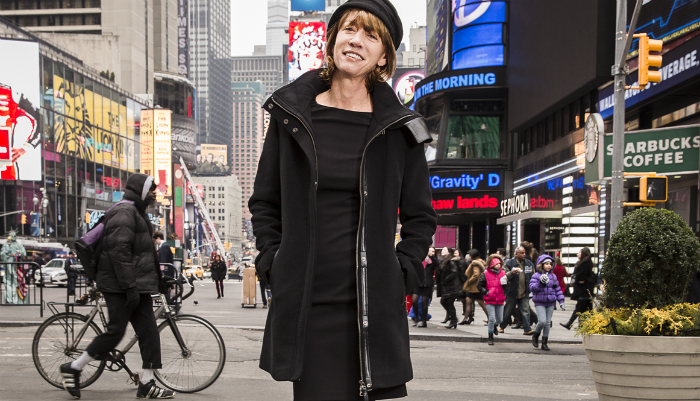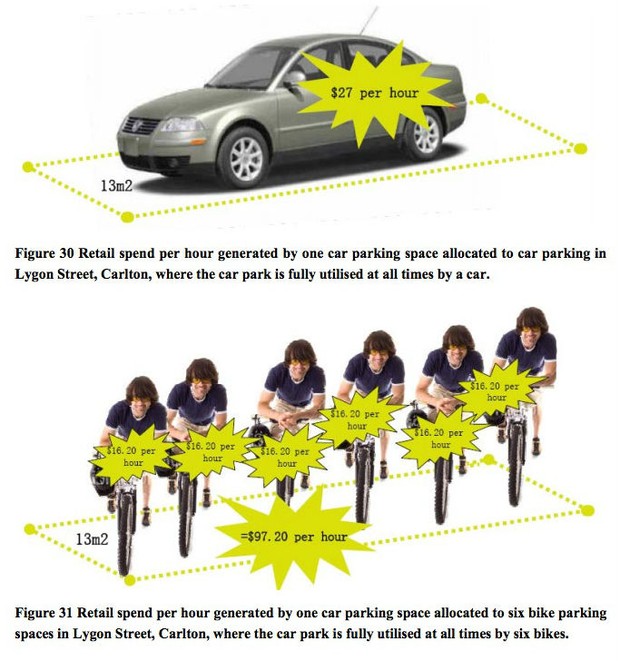

Home » Bikes: good for business! Weekly round-up #36!

This week’s round-up features wind chimes, overhaul of NYC cycling infrastructure, two theses that put cycling in a good light, archaic attitudes from an Australian state premier, and a feel-good story for the cycle commuters among us.
The top image is taken from a Reddit post by user MonkeyEvil in which he introduces “the most expensive wind chime ever”. Depending on your perspective this is either inspired art, or treacherous betrayal of high quality bike gear. People in the comments interrogate the creator on whether the sound of the wind blowing through the chimes justifies their creation:
Bicycling.com published a great interview with Janette Sadik-Khan, the woman who oversaw the building of just shy of 400 miles of bike lane in a decade in her tenure as commissioner of NYC DOT. This led to four times as many riders, a reduction of 35% in injuries for cyclists (and pedestrians too: “streets are ecosystems and we depend on each other”, she explains), and in Janette rightfully carving out a place for herself as someone who knows what they’re talking about.
 Janette
JanetteShe describes the “magic of mobility” built into each bicycle as part of her motivation, adding that “it really was the first taste of freedom as a kid – you could get anywhere on your own power and not depend on anyone”. A fine impulse to act on! Another of her achievements was increasing sales figures by 49% on one street where bike lanes were installed in favour of parking: a great piece of evidence for convincing other business owners, who can sometimes represent strong opposition to new bike infrastructure on the streets near their businesses.
Her book ‘Streetfight: Handbook for an Urban Revolution’ explores these subjects in further detail and will be published in March. Thanks to Bicycling for the great interview, which you can read in full here.
While reading around on the debate between business owners and cycle lane advocates we came across a good article collating various studies into converting street parking into bike lanes in retail areas. It was published last March so we won’t go into to much detail in the weekly round-up (that’d be cheating!), but it’s worth a look if you’re interested in the topic.
We enjoyed the image below, created by a Masters student in Melbourne, which effectively highlights the comparative spend of drivers and cyclists. Punchy graphics like this usually convey potential benefits better than a heated debate ever could:
 Taken from an archived version of her Masters thesis, here
Taken from an archived version of her Masters thesis, hereAlso in Australia, New South Wales to be specific, a confusing kerfuffle is unfolding. The state premier Duncan Gay recently announced plans to make cyclists carry compulsory ID cards, paired with massive increases in fines for cycling offences (running a red light will now cost you $425, up from $71). These potentially Draconian measures have sparked a debate on privacy, surveillance, and have led to accusations against the premier of ‘totalitarianism’.
Calls to action are forthcoming from cycling organisations in the region, encapsulated nicely by this piece from The Bicycle Network. They also give 7 reasons against the IDs and increased fine, number 6 of which resonates particularly strongly: “Make no mistake, compulsory ID means you’ll require the permission of the government before you ride. It’s strikes at the very heart of what’s great about bike riding.”
A video interview with Gay from last year seems to suggest his motivations are in the right place (reducing deaths among cyclists and pedestrians), but his means are considered by some to be controversial and archaic:
If you happen to be reading from NSW we’d love to hear your thoughts on this subject in the comments below!
A little bit closer to home we have news that cycle commuters in London are 6x healthier than their non-pedaling counterparts, originally reported in the Evening Standard.
A study found that cyclists four times as likely to get the minimum recommended weekly exercise of 150 minutes – a figure given by the World Health Organisation and the NHS (who presumably know what they’re talking about!). Glenn Stewart, who carried out the study, explains that 150 minutes as one amount can seem daunting, but a 15 minute bike ride each way on your commute in a normal week fulfills it immediately.
This is another string in the bow for the argument that cycling is beneficial for personal health and reducing the burden on the NHS, and that money invested into cycling infrastructure projects is money well spent!


Leave a Reply